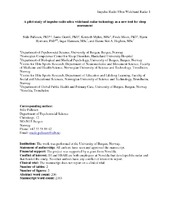A pilot study of impulse radio ultra wideband radar technology as a new tool for sleep assessment
Pallesen, Ståle; Grønli, Janne; Myhre, Kenneth; Moen, Frode; Bjorvatn, Bjørn; Hanssen, Ingar; Heglum, Hanne Siri Amdahl
Peer reviewed, Journal article
Accepted version

View/
Date
2018Metadata
Show full item recordCollections
Original version
https://doi.org/10.5664/jcsm.7236Abstract
Study Objectives To validate Impulse radio ultra wideband pulse-doppler radar technology against polysomnography (PSG) for sleep assessment. Methods In all, 12 participants were recruited and their overnight sleep was assessed both by a Novelda XeThru radar and PSG. Two subjects had two nightly recordings, whereas 10 had one recording. Epoch by epoch (30 seconds) comparisons from bedtime to rise time were conducted. Concordance was estimated in terms of the mean difference between the radar and the PSG estimates regarding sleep onset latency, wake time after sleep onset and total sleep time. In addition, accuracy, sensitivity, specificity and Cohen kappa were calculated. Results The mean difference (minutes) between the radar and the PSG registrations was −5.7 minutes (standard deviation [SD] = 22.1 minutes) for sleep onset latency, 6.4 minutes (SD = 32.5 minutes) for wake after sleep onset, and 1.5 minutes (SD = 24.6 minutes) for total sleep time. The mean values obtained for accuracy, sensitivity, specificity and Cohen kappa were 0.931, 0.961, 0.695 and 0.670, respectively. Conclusion Impulse radio ultra wideband radar technology is a promising tool in terms of affordable and practical objective sleep assessment. Further technical development and more validation studies are needed in order to conclude about the utility potential of this device.